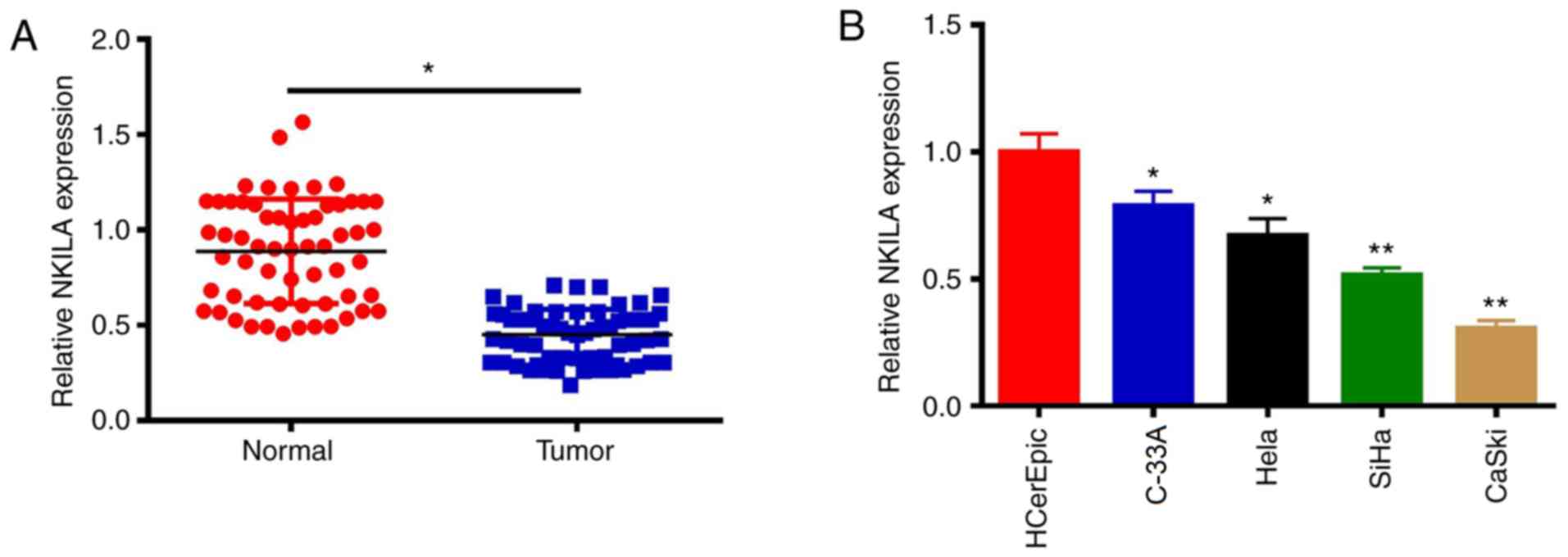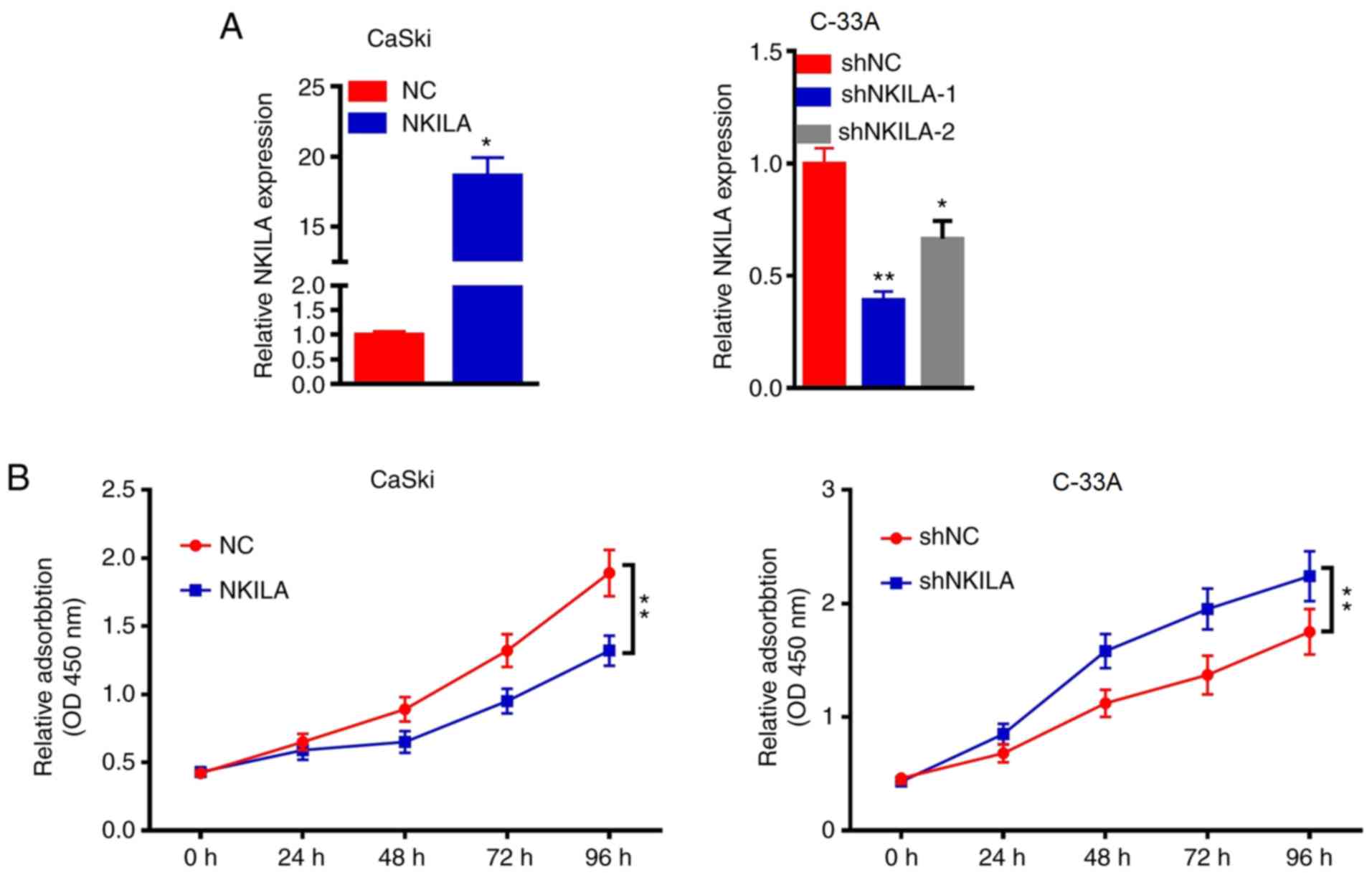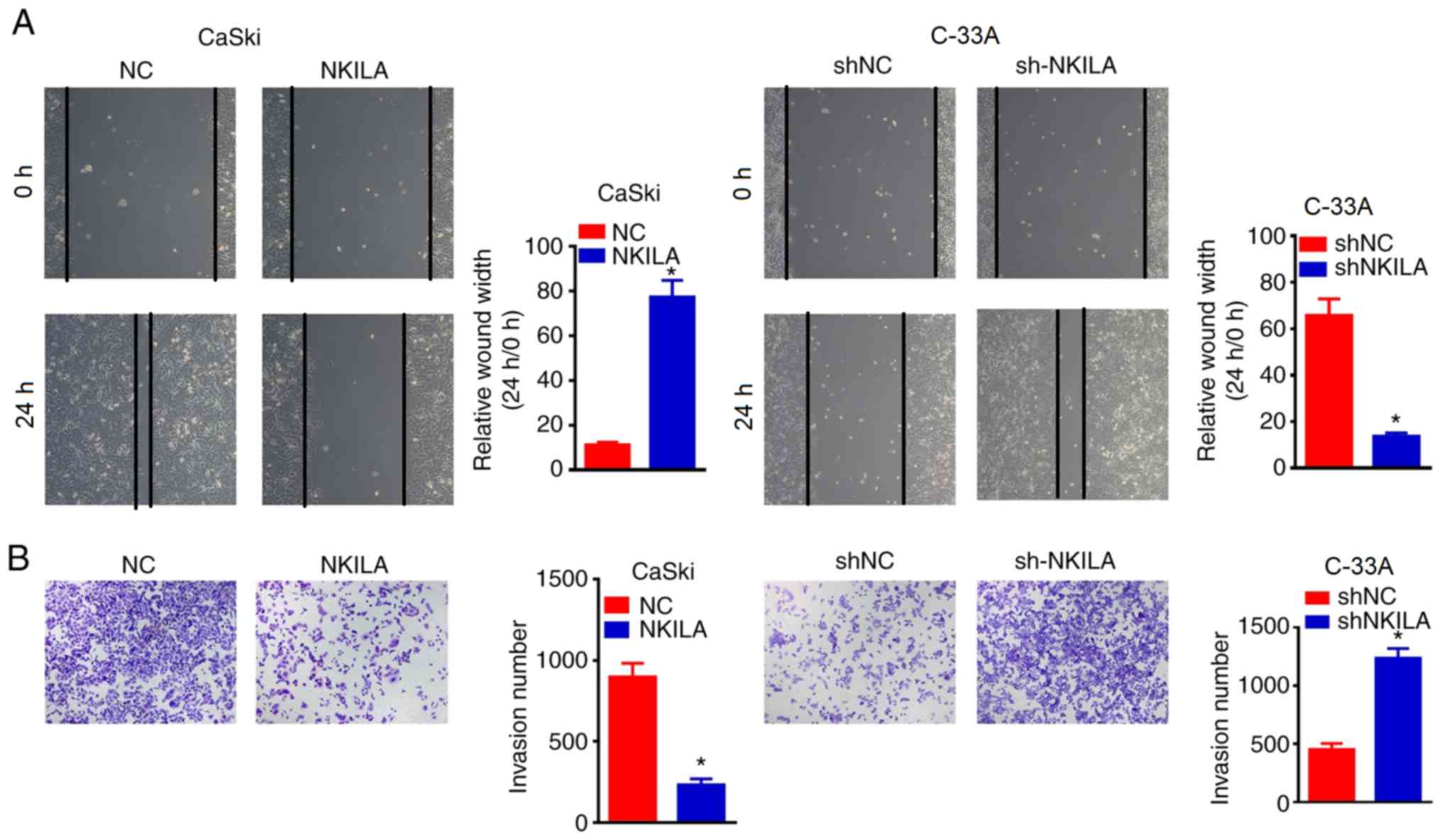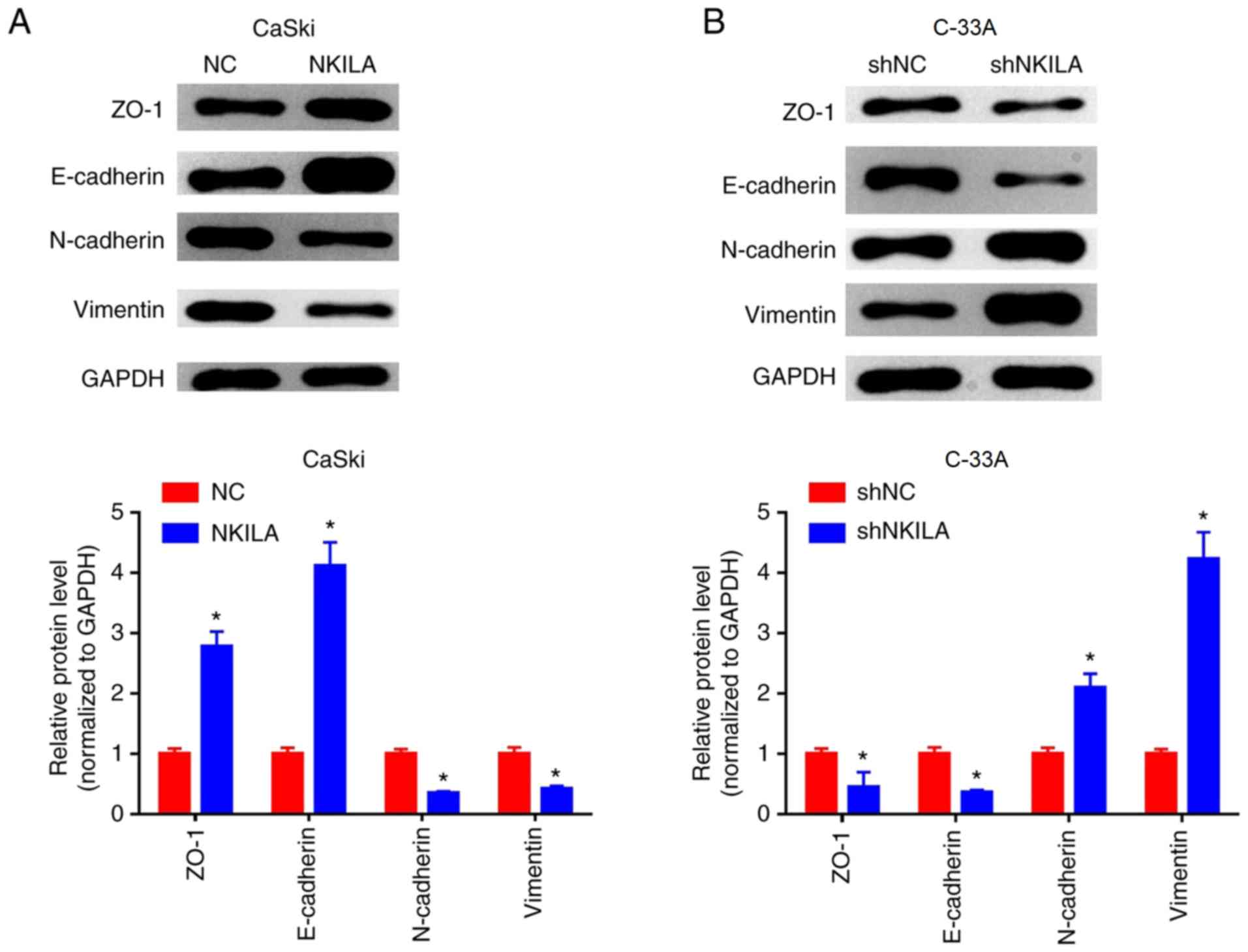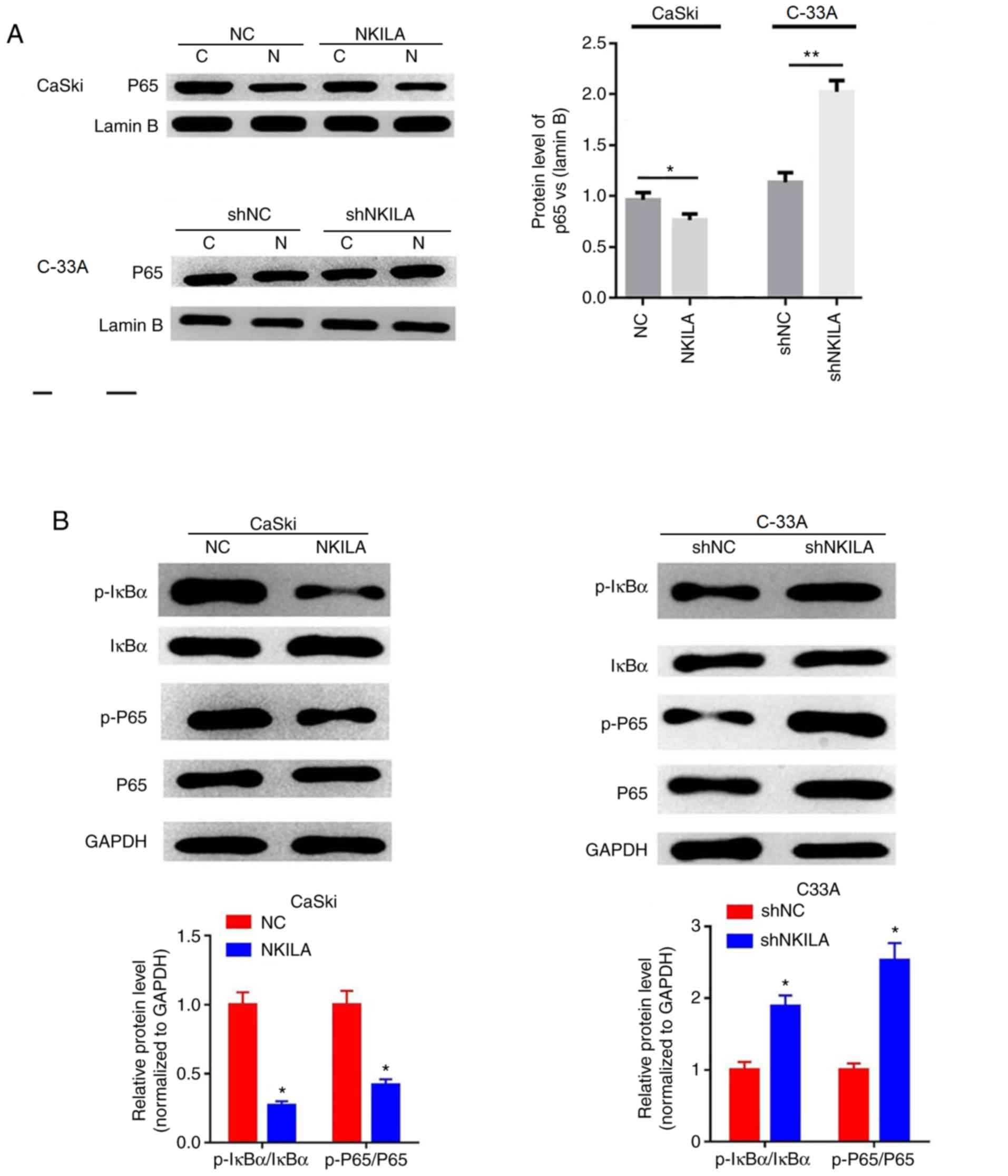|
1
|
Small W Jr, Bacon MA, Bajaj A, Chuang LT,
Fisher BJ, Harkenrider MM, Jhingran A, Kitchener HC, Mileshkin LR,
Viswanathan AN and Gaffney DK: Cervical cancer: A global health
crisis. Cancer. 123:2404–2412. 2017.PubMed/NCBI View Article : Google Scholar
|
|
2
|
Jeronimo J, Castle PE, Temin S and Shastri
SS: Secondary prevention of cervical cancer: American Society of
Clinical Oncology resource-stratified clinical practice guideline
summary. J Oncol Pract. 13:129–133. 2017.PubMed/NCBI View Article : Google Scholar
|
|
3
|
Gao P and Wei GH: Genomic insight into the
role of lncRNA in cancer susceptibility. Int J Mol Sci.
18(E1239)2017.PubMed/NCBI View Article : Google Scholar
|
|
4
|
Zhang J, Yao T, Lin Z and Gao Y: Aberrant
methylation of MEG3 functions as a potential plasma-based biomarker
for cervical cancer. Sci Rep. 7(6271)2017.PubMed/NCBI View Article : Google Scholar
|
|
5
|
Wang YF, Zhang S, Li XQ and Wang Y:
Expression of lncRNA HULC in cervical cancer and its correlation
with tumor progression and patient survival. Eur Rev Med Pharmacol
Sci. 20:3987–3991. 2016.PubMed/NCBI
|
|
6
|
Kim HJ, Lee DW, Yim GW, Nam EJ, Kim S, Kim
SW and Kim YT: Long non-coding RNA HOTAIR is associated with human
cervical cancer progression. Int J Oncol. 46:521–530.
2015.PubMed/NCBI View Article : Google Scholar
|
|
7
|
Chen G, Wang Z, Wang D, Qiu C, Liu M, Chen
X, Zhang Q, Yan G and Cui Q: LncRNA Disease: A database for
long-non-coding RNA-associated diseases. Nucleic Acids Res. 41
(Database Issue):D983–D986. 2013.PubMed/NCBI View Article : Google Scholar
|
|
8
|
Wu W, Chen F, Cui X, Yang L, Chen J, Zhao
J, Huang D, Liu J, Yang L, Zeng J, et al: LncRNA NKILA suppresses
TGF-β-induced epithelial-mesenchymal transition by blocking NF-κB
signaling in breast cancer. Int J Cancer. 143:2213–2224.
2018.PubMed/NCBI View Article : Google Scholar
|
|
9
|
Ke S, Li RC, Meng FK and Fang MH: NKILA
inhibits NF-κB signaling and suppresses tumor metastasis. Aging
(Albany NY). 10:56–71. 2018.PubMed/NCBI View Article : Google Scholar
|
|
10
|
Zandi E, Rothwarf DM, Delhase M, Hayakawa
M and Karin M: The IkappaB kinase complex (IKK) contains two kinase
subunits, IKKalpha and IKKbeta, necessary for IkappaB
phosphorylation and NF-kappaB activation. Cell. 91:243–252.
1997.PubMed/NCBI View Article : Google Scholar
|
|
11
|
Huang W, Cui X, Chen J, Feng Y, Song E, Li
J and Liu Y: Long non-coding RNA NKILA inhibits migration and
invasion of tongue squamous cell carcinoma cells via suppressing
epithelial-mesenchymal transition. Oncotarget. 7:62520–62532.
2016.PubMed/NCBI View Article : Google Scholar
|
|
12
|
Ayre JE: Cervical cancer. Chronic
inflammation, stress and adaptation factors. Acta Unio Int Contra
Cancrum. 12:20–27. 1956.PubMed/NCBI
|
|
13
|
Makarov SS: NF-kappaB as a therapeutic
target in chronic inflammation: Recent advances. Mol Med Today.
6:441–448. 2000.PubMed/NCBI View Article : Google Scholar
|
|
14
|
Livak KJ and Schmittgen TD: Analysis of
relative gene expression data using real-time quantitative PCR and
the 2(-Delta Delta C(T)) method. Methods. 25:402–408.
2001.PubMed/NCBI View Article : Google Scholar
|
|
15
|
Brabletz T, Kalluri R, Nieto MA and
Weinberg RA: EMT in cancer. Nat Rev Cancer. 18:128–134.
2018.PubMed/NCBI View Article : Google Scholar
|
|
16
|
De Craene B and Berx G: Regulatory
networks defining EMT during cancer initiation and progression. Nat
Rev Cancer. 13:97–110. 2013.PubMed/NCBI View
Article : Google Scholar
|
|
17
|
Shyamsunder P, Verma RS and Lyakhovich A:
ROMO1 regulates RedOx states and serves as an inducer of
NF-κB-driven EMT factors in Fanconi anemia. Cancer Lett. 361:33–38.
2015.PubMed/NCBI View Article : Google Scholar
|
|
18
|
Wang B, Parobchak N, Martin A, Rosen M, Yu
LJ, Nguyen M, Gololobova K and Rosen T: Screening a small molecule
library to identify inhibitors of NF-κB inducing kinase and
pro-labor genes in human placenta. Sci Rep. 8(1657)2018.PubMed/NCBI View Article : Google Scholar
|
|
19
|
Li J, Meng H, Bai Y and Wang K: Regulation
of lncRNA and its role in cancer metastasis. Oncol Res. 23:205–217.
2016.PubMed/NCBI View Article : Google Scholar
|
|
20
|
Yu G, Yao W, Wang J, Ma X, Xiao W, Li H,
Xia D, Yang Y, Deng K, Xiao H, et al: LncRNAs expression signatures
of renal clear cell carcinoma revealed by microarray. PLoS One.
7(e42377)2012.PubMed/NCBI View Article : Google Scholar
|
|
21
|
Yang G, Lu X and Yuan L: LncRNA: A link
between RNA and cancer. Biochim Biophys Acta. 1839:1097–1109.
2014.PubMed/NCBI View Article : Google Scholar
|
|
22
|
Goyal N, Kesharwani D and Datta M: Lnc-ing
non-coding RNAs with metabolism and diabetes: Roles of lncRNAs.
Cell Mol Life Sci. 75:1827–1837. 2018.PubMed/NCBI View Article : Google Scholar
|
|
23
|
Han P, Li JW, Zhang BM, Lv JC, Li YM, Gu
XY, Yu ZW, Jia YH, Bai XF, Li L, et al: The lncRNA CRNDE promotes
colorectal cancer cell proliferation and chemoresistance via
miR-181a-5p-mediated regulation of Wnt/beta-catenin signaling. Mol
Cancer. 16(9)2017.PubMed/NCBI View Article : Google Scholar
|
|
24
|
Gooding AJ, Zhang B, Jahanbani FK, Gilmore
HL, Chang JC, Valadkhan S and Schiemann WP: The lncRNA BORG Drives
Breast Cancer Metastasis and Disease Recurrence. Sci Rep.
7(12698)2017.PubMed/NCBI View Article : Google Scholar
|
|
25
|
Liu Y, Yang Y, Li L, Liu Y, Geng P, Li G
and Song H: LncRNA SNHG1 enhances cell proliferation, migration,
and invasion in cervical cancer. Biochem Cell Biol. 96:38–43.
2018.PubMed/NCBI View Article : Google Scholar
|
|
26
|
Lu H, He Y, Lin L, Qi Z, Ma L, Li L and Su
Y: Long non-coding RNA MALAT1 modulates radiosensitivity of HR-HPV+
cervical cancer via sponging miR-145. Tumour Biol. 37:1683–1691.
2016.PubMed/NCBI View Article : Google Scholar
|
|
27
|
Wang X, Wang Z, Wang J, Wang Y, Liu L and
Xu X: LncRNA MEG3 has anti-activity effects of cervical cancer.
Biomed Pharmacother. 94:636–643. 2017.PubMed/NCBI View Article : Google Scholar
|
|
28
|
Castellanos-Rubio A, Kratchmarov R,
Sebastian M, Garcia-Etxebarria K, Garcia L, Irastorza I and Ghosh
S: Cytoplasmic form of CarlrlncRNA facilitates inflammatory gene
expression upon NF-κB activation. J Immunol. 199:581–588.
2017.PubMed/NCBI View Article : Google Scholar
|
|
29
|
Lu Z, Li Y, Wang J, Che Y, Sun S, Huang J,
Chen Z and He J: Long non-coding RNA NKILA inhibits migration and
invasion of non-small cell lung cancer via NF-κB/Snail pathway. J
Exp Clin Cancer Res. 36(54)2017.PubMed/NCBI View Article : Google Scholar
|
|
30
|
Steeg PS: Tumor metastasis: Mechanistic
insights and clinical challenges. Nat Med. 12:895–904.
2006.PubMed/NCBI View
Article : Google Scholar
|
|
31
|
Thiery JP: Epithelial-mesenchymal
transitions in development and pathologies. Curr Opin Cell Biol.
15:740–746. 2003.PubMed/NCBI View Article : Google Scholar
|
|
32
|
Qureshi R, Arora H and Rizvi MA: EMT in
cervical cancer: Its role in tumour progression and response to
therapy. Cancer Lett. 356:321–331. 2015.PubMed/NCBI View Article : Google Scholar
|
|
33
|
Tan X, Zhou C and Liang Y, Lai YF and
Liang Y: Circ_0001971 regulates oral squamous cell carcinoma
progression and chemosensitivity by targeting miR-194/miR-204 in
vitro and in vivo. Eur Rev Med Pharmacol Sci. 24:2470–2481.
2020.PubMed/NCBI View Article : Google Scholar
|
|
34
|
Cao MX, Jiang YP, Tang YL and Liang XH:
The crosstalk between lncRNA and microRNA in cancer metastasis:
Orchestrating the epithelial-mesenchymal plasticity. Oncotarget.
8:12472–12483. 2017.PubMed/NCBI View Article : Google Scholar
|
|
35
|
Sun NX, Ye C, Zhao Q, Zhang Q, Xu C, Wang
SB, Jin ZJ, Sun SH, Wang F and Li W: Long noncoding RNA-EBIC
promotes tumor cell invasion by binding to EZH2 and repressing
E-cadherin in cervical cancer. PLoS One. 9(e100340)2014.PubMed/NCBI View Article : Google Scholar
|
|
36
|
Xu F and Zhang J: Long non-coding RNA
HOTAIR functions as miRNA sponge to promote the epithelial to
mesenchymal transition in esophageal cancer. Biomed Pharmacother.
90:888–896. 2017.PubMed/NCBI View Article : Google Scholar
|
|
37
|
Ying L, Chen Q, Wang Y, Zhou Z, Huang Y
and Qiu F: Upregulated MALAT-1 contributes to bladder cancer cell
migration by inducing epithelial-to-mesenchymal transition. Mol
Biosyst. 8:2289–2294. 2012.PubMed/NCBI View Article : Google Scholar
|
|
38
|
Sun R, Qin C, Jiang B, Fang S, Pan X, Peng
L, Li W, Li Y and Li G: Down-regulation of MALAT1 inhibits cervical
cancer cell invasion and metastasis by inhibition of
epithelial-mesenchymal transition. Mol Biosyst. 12:952–962.
2016.PubMed/NCBI View Article : Google Scholar
|
|
39
|
Hu Y, Sun X, Mao C, Guo G, Ye S, Xu J, Zou
R, Chen J, Wang L, Duan P and Xue X: Upregulation of long noncoding
RNA TUG1 promotes cervical cancer cell proliferation and migration.
Cancer Med. 6:471–482. 2017.PubMed/NCBI View
Article : Google Scholar
|
|
40
|
Wu Y, Deng J, Rychahou PG, Qiu S, Evers BM
and Zhou BP: Stabilization of snail by NF-kappaB is required for
inflammation-induced cell migration and invasion. Cancer Cell.
15:416–428. 2009.PubMed/NCBI View Article : Google Scholar
|
|
41
|
Wang H, Song X, Li M, Wang X, Tao Y, Xiya
X, Liu H, Zhao Y, Chang D and Sha Q: The role of TLR4/NF-κB
signaling pathway in activated microglia of rats with chronic high
intraocular pressure and vitro scratch injury-induced microglia.
Int Immunopharmacol. 83(106395)2020.PubMed/NCBI View Article : Google Scholar
|
|
42
|
Xiao G, Harhaj EW and Sun SC:
NF-kappaB-inducing kinase regulates the processing of NF-kappaB2
p100. Mol Cell. 7:401–409. 2001.PubMed/NCBI View Article : Google Scholar
|
|
43
|
Hayden MS and Ghosh S: Shared principles
in NF-kappaB signaling. Cell. 132:344–362. 2008.PubMed/NCBI View Article : Google Scholar
|
|
44
|
Yang Z, Li C, Wang X, Zhai C, Yi Z, Wang
L, Liu B, Du B, Wu H, Guo X, et al: Dauricine induces apoptosis,
inhibits proliferation and invasion through inhibiting NF-kappaB
signaling pathway in colon cancer cells. J Cell Physiol.
225:266–275. 2010.PubMed/NCBI View Article : Google Scholar
|
|
45
|
Hsu YL, Chen CY, Lin IP, Tsai EM, Kuo PL
and Hou MF: 4-Shogaol, an active constituent of dietary ginger,
inhibits metastasis of MDA-MB-231 human breast adenocarcinoma cells
by decreasing the repression of NF-κB/Snail on RKIP. J Agric Food
Chem. 60:852–861. 2012.PubMed/NCBI View Article : Google Scholar
|
|
46
|
Chua HL, Bhat-Nakshatri P, Clare SE,
Morimiya A, Badve S and Nakshatri H: NF-kappaB represses E-cadherin
expression and enhances epithelial to mesenchymal transition of
mammary epithelial cells: Potential involvement of ZEB-1 and ZEB-2.
Oncogene. 26:711–724. 2007.PubMed/NCBI View Article : Google Scholar
|
|
47
|
Li Q, Liu BC, Lv LL, Ma KL, Zhang XL and
Phillips AO: Monocytes induce proximal tubular
epithelial-mesenchymal transition through NF-kappa B dependent
upregulation of ICAM-1. J Cell Biochem. 112:1585–1592.
2011.PubMed/NCBI View Article : Google Scholar
|
|
48
|
Wang L, Guo H, Yang L, Dong L, Lin C,
Zhang J, Lin P and Wang X: Morusin inhibits human cervical cancer
stem cell growth and migration through attenuation of NF-κB
activity and apoptosis induction. Mol Cell Biochem. 379:7–18.
2013.PubMed/NCBI View Article : Google Scholar
|
|
49
|
Lu Z, Chen Z, Li Y, Wang J, Zhang Z, Che
Y, Huang J, Sun S, Mao S, Lei Y, et al: TGF-β-induced NKILA
inhibits ESCC cell migration and invasion through NF-κB/MMP14
signaling. J Mol Med (Berl). 96:301–313. 2018.PubMed/NCBI View Article : Google Scholar
|
|
50
|
Mathy NW and Chen XM: Long non-coding RNAs
(lncRNAs) and their transcriptional control of inflammatory
responses. J Biol Chem. 292:12375–12382. 2017.PubMed/NCBI View Article : Google Scholar
|















